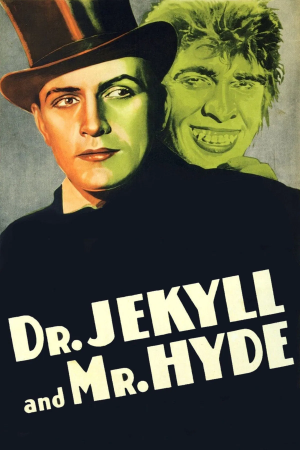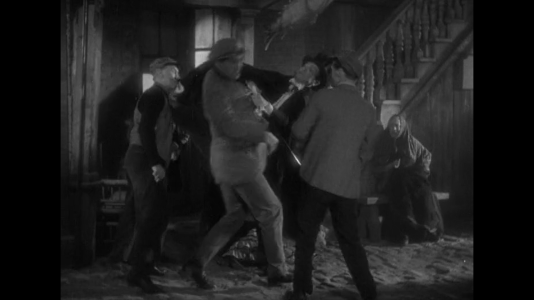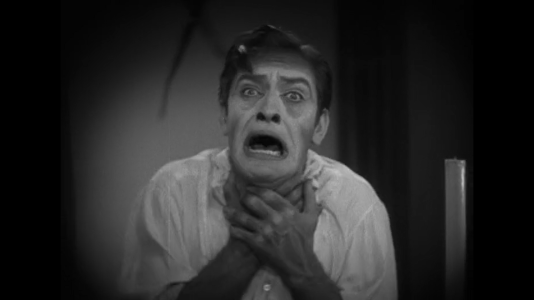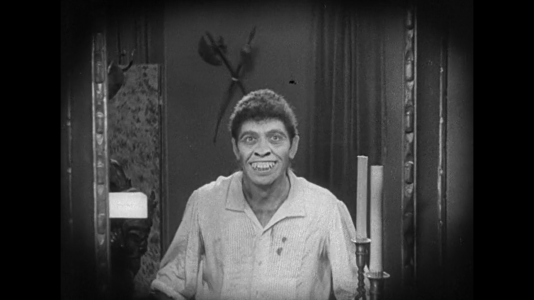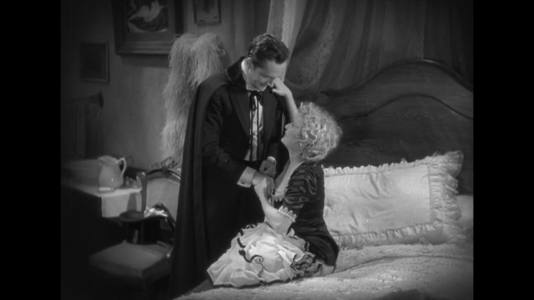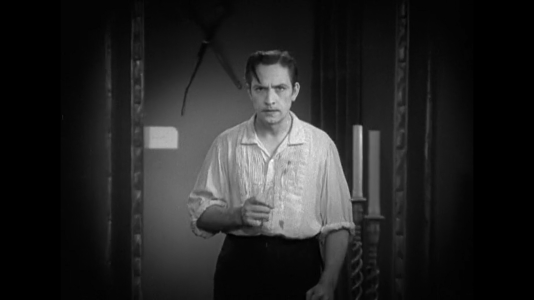To clarify, this isn't a thread for reviews of movies starring octopods, though that would be cute as fuck. No, this is where I'll occasionally dump little movie reviews and probably be focusing almost entirely on old school stuff, as that's my favourite flavour of jam.
Anyone else can feel free to add on or post their own stuff here too, I don't mind at all. Let the discussion and memes flow.
First up, a longer bit about my one of my newest movie favourites, 1931's Dr Jekyll and Mr Hyde. This movie entirely surprised me, honestly. I went in with really no expectations other than I heard it was pretty neat, and I wasn't prepared for just how neat it was.
I don't think I need to explain much about this basic story given it's kind of one of the most famous and influential stories of all time, but I'll do it nonetheless, no need to thank me. Dr Henry Jekyll (Frederic Marsh) is a scientist who's become convinced that through a specific chemical concoction that he's capable of severing the 'good' of a man from the 'evil', the two sides that are eternally chained together in the human soul, each affecting the other in negative ways; the evil is repressed by the good, and the good side feels guilt over the evil. By ridding the evil out of a man's soul through science and shit, his idea is that the good would then be untethered; "what heights it might scale!" The evil then would be free to fulfill itself without bringing down the good side. I'm really not sure how this separation happens logistically as it sounds like he's talking about literally duplicating someone in effect, but it's science, don't worry about it.
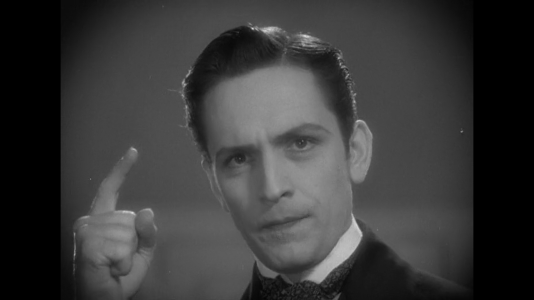
Frederic Marsh actually won an Academy Award for his performance in this movie, at the third Academy Award ceremony ever; the Oscars started in 1929.
Great effort is made to sell Jekyll as a truly upstanding man. He often performs surgery for free on the downtrodden, takes time away from silly social gatherings to help random precocious little poor girls walk again in a really oddly drawn out scene. He's also engaged to Muriel Carew (Rose Hobart), and through him constantly stating it we come to learn hopelessly so. He wishes to marry her right away, but her father, General Carew (Halliwell Hobbes) demands that they wait, as 'that's just how it's done'. After an argument with his father-in-law, Jekyll and his fellow distinguished gentleman and good friend, Dr John Lanyon (Holmes Herbert), then argue about Jekyll's 'ridiculous' theory and his preposterous potion that can separate a man's moral psyche. Their interrupted by a kerfuffle down the road, and rescue lounge singer Ivy (Miriam Hopkins) from being old-timey accosted by a fellow of low character outside the boarding house she rents a room. What a rescue indeed; Jekyll delivers a fisticuffs as only a man of true and strong moral character could while wearing a cape and top hat.
Ivy is a very friendly woman indeed, and really tries her best to tempt Jekyll with some activities of an amorous nature. We'll touch more in depth on this later, but this movie got away with some scandalous stuff for 1931. The scene culminates in her just grabbing him after stripping down (tastefully of course) and giving him a big ol' kiss.
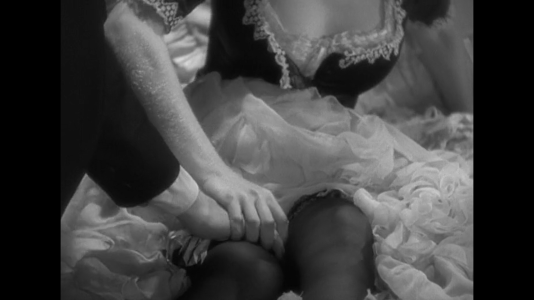
She's definitely not subtle, and holy shit avert your eyes; there's the faintest hint of cleavage! in 1931!
While he's clearly tempted, Jekyll of course laughs this sexual assault off as a man of such moral character would. The next day, he decides to test his concoction out on himself of course, as this was the story that essentially inspired the entire schtick trope of the tragic/mad scientist. This gives way to not just the end of my play-by-play set up of the movies plot but one of the greatest strengths of this entire thing; the goddamn transformation scenes as Jekyll warps into his evil spit personality, Mr Hyde.
I cannot hammer home enough how utterly convincing the makeup and framing is for the Hyde transformations, and it's something that must be seen in video rather than just some screenshots; I implore you to watch this. The technique used is much easier to understand when you see it in motion, as it happens in real time.
The first transformation scene, the one most show-off of the whole thing, plays out as a POV shot of Jekyll staring into a mirror as he takes the serum, begins to choke on it, then in real time his face begins to change before the camera backs away and starts getting all abstract on us with a twisted montage of Jekyll's frustrations as it spins around the room. When it cuts back, the transformation is complete; Jekyll is now Mr Hyde, who represents all of Jekyll's repressed evil urges, his unbridled passions and his hidden violence in its primal form. His driving motive and only desire is to do what ever he wants, and he definitely does just that as the movie plays out.
The makeup technique used here that let Jekyll's face change right in front of you is insane. When the scene begins and Frederic Marsh is looking into the mirror, the makeup you see later is already applied to his face; since it's only in black-and-white, you can't see it as the makeup itself is coloured. Once the transformation begins, a coloured glass lens filter is slowly removed from the camera, again hidden by the fact that no colour is discernable in black-and-white. As this filter is removed, the makeup begins to contrast to the different lighting that you again can't see on camera, and the makeup then beigns to slowly show on Jekyll's face, giving the illusion that he's changing in real time. It's an utterly inventive and revolutionary technique for 1931, so much so in fact that how they did this was entirely a secret until 1969 when the director, Rouben Mamoulian, revealed it in an interview. It's one part of the best strength of this movie, with the other half being the makeup on Hyde proper. The only other movie I'm aware of that uses the same technique was 1937's Sh! The Octopus which I think is a cool title for no specific reason at all.
Mr Hyde looks absolutely stellar in this movie just from the practical makeup done on Frederic Marsh. He starts out looking something still related to human, but as the movie goes on he gets more and more devolved with each transformation which is a nice touch. It's as if the acts that he commits over the movie corrupt him more and more, and by the end he's even more monstrous looking. It's also a really nice touch to have him clearly inspired by an ape-like look; it goes well with the idea of him being the repressed side of Jekyll, so repressed that he's fallen back on the evolutionary scale itself. This look and idea of Mr Hyde I think has been the most influential in pop culture going forward for a reason, in that it's fantastic. Hyde is stocky, agile, and has got some real nasty teeth. Marsh's acting also really sells it as he acts entirely differently as Hyde, playing him in fits of excitable, twitchy mania but always utterly despicable. He is a complete and utter fiend in ways that specifically follow the book source material pretty closely compared to the rest of the movie; we'll get into that at the end.
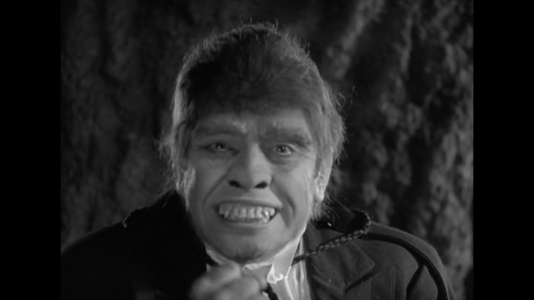
Marsh's ability to still give legible Hyde dialogue with that large of a set of fake teeth in is seriously an accomplishment. You earned that Academy Award, buddy.
The story plays very much with the concept of repression and morality and how they're intrinsically linked, but it also touches on other explorations as well. Often its musings on the nature of rigid society, such as Muriel's father not letting her and Jekyll marry right away 'as that's just not how it's done, Jekyll'. He waited for his marriage as was the style of the time, as did his fathers, and therefore that's the rule, damnit. Society itself is of course a large source of a man's repression, other than himself so it makes sense that the concept is extrapolated onto it. Even Dr Jekyll helping the clearly implied to be the downtrodden and 'low' members of society the way he does in the beginning of the film is given a headshaking nod of disapproval from some of the more haughty members of the upper crust that Muriel and her father belong too, and I think that's a deliberate little bit of pointing done.
From a style perspective, this movie also deserves some serious credit. It's got some really inventive imagery, and some fantastic cinematography. There's repeating visual motifs that play throughout, such as Ivy swaying her stocking'd thigh back and forth in the beginning and during the first Hyde transformation, and there's very great uses of POV camera work even outside of that first Hyde appearance. I'm not even sure how they did some of those POV's, considering so many of them directly involve the camera looking directly into a mirror (I'm guessing just as a pure flex of 'yeah, we're that fucking cool'). While it lacks some of the more grandiose sets like something Universal was doing at the time with Dracula and the first Frankenstein, it still creates a good sense of tension and mood through the shot choices and the performances. The film also employs extreme closeups of faces quite a few times for different effects; there's one between Muriel and Jekyll to sell their closeness, and also a few with Hyde to unsettle you.
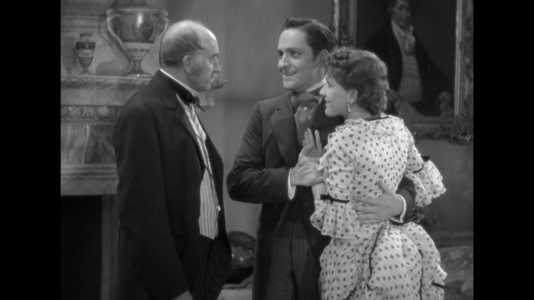
"Hahaha, I love you my father-in-law whom I greatly admire, and definitely don't repress of my hatred of to the point where it became a split personality of mine after a weird science experiment." -not actual dialogue from this scene, obviously.
Let's talk about one other major thing of this movie; it's really risque content for 1931. This was pre-MPAA code, so movies could actually get away with more things on average if they wanted to, but few wanted to mainly due to societal norms of the time of course. Dr Jekyll and Mr Hyde wanted to however, and by god did they do it. This was a very sexually suggestive movie. Let's go back to that scene with Jekyll and Ivy I mentioned in the opening plot set-up. Yeah, I made the joke about the barely-there cleavage which by itself was risky enough, but I left out that you see half a fucking tit when she's trying to seduce him. You see half a boob.
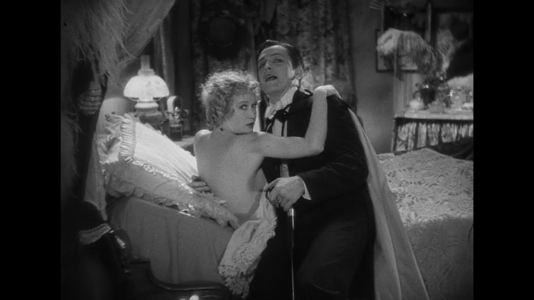
Seriously, this was 1931. Actually think about that for a second. You see like half a boob at a time era when you weren't even supposed to know they existed unless you've been married for 2 1/2 years and the lights are off in the room during. I think it even jiggled briefly.
It's mainly through the character of Ivy that this shows, contrasting with the very chaste courtship Jekyll has with his fiancee in comparison. I don't think it's an unintended plot point that the day after Jekyll has that whole thing happen to him with Ivy is the day he decides to go through with his experiment, after all. Another character becomes associated with her as the movie goes on, and unfortunately it's Mr Hyde. He becomes enamored with her, essentially holding her hostage where he does something this movie also barely got away with; I think this may be the first movie to suggest at a rape. Nothing is shown of course, but the implication is present. Afterwards, Hyde just torments this poor girl in scenes that are greatly unsettling and hard to watch, with both actors absolutely selling either Hyde's mania or Ivy's near breakdown. One scene in particular with them I think should have earned Miriam Hopkins an award just as Frederic Marsh earned one; she's exceptional. Here's the scene in question, her performance is exquisite and goddamn is Hyde a fucking monster. He bounces between aggressively seeking validation from this woman he's utterly tormenting, then lashing out at her the next moment; so like your average incel, really, so it's pretty on the mark.
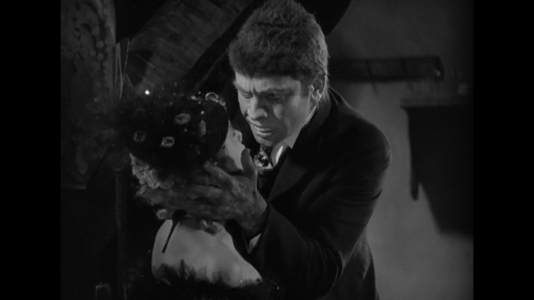
"I hurt you because I love you. I want you. And what I want, I get."- actual dialogue from this scene. Jesus, I was actually at a loss for words watching this scene; goddamn, Dr Jekyll and Mr Hyde.
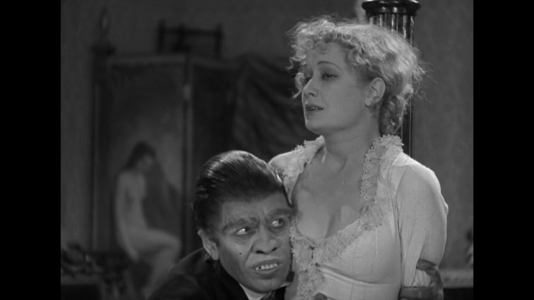
Miriam Hopkins just absolutely nails her performance. Just look at that face of sheer terror, as the gross monstrous ape man clings to her.
The movie of course tells the adapted storyline of 1886's 'The Strange Case of Dr Jekyll and Mr Hyde' by Robert Louis Stevenson. Like a lot of contemporary adaptations of literature, it took some liberties. For one, the original story wasn't even from the perspective of Jekyll or Hyde; it was actually told through following one of his friends who was cut from the movie, a Mr. John Utterson. He starts seeing some odd occurrences involving his friend Jekyll and hearing sordid tales of a Mr Hyde that play out over a least a year or so in the story, not knowing then of course that Hyde and his good friend are one and the same. Hyde was described in Stevenson's story as simply an 'evil looking man' of short stature, largely to make him seem smaller and more pathetic than the robust Jekyll; in this movie of course, Hyde is very different. In the original story, Jekyll has been transforming into Hyde even before the story picks up, while in the movie it of course only begins during the events of the film. The biggest change you may be surprised to hear is that there is a total of a single female character in the original story if I remember correctly and its not Ivy or Muriel (Ivy was made for this specifically this movie adaptation, while Muriel was introduced in an earlier stage rendition that itself inspired much going forward), and she's only mentioned in passing. Jekyll is neither engaged or married in it, or not specifically mentioned to be, at the very least. There is some actually compelling theories out there that Stevenson may have been alluding to Jekyll being a repressed homosexual as a hidden layer to the stories subtext, which I find pretty interesting. He was personal friends with quite a few gay men during a time when it was literally a crime to be one, so perhaps some element of that did make its way into the story. There is a particular phrase that Jekyll uses near the end of the story when he's spilling the beans through written form to Utterson, where he says something along the lines of "some things Hyde committed will never be spoken of"; given the novel is from 1886 and again it was literally a crime at that point, you can read something into that for sure.
Do I recommend 1931 Dr Jekyll and Mr Hyde? Absolutely I fucking do. Watch this movie, if you have any love for classic horror. It's got plenty of that old-timey energy for sure, but it also has some genuinely amazing and fascinating layers even beyond that. It's revolutionary makeup technique that was actually unknown how the fuck they pulled off until the director spilled the beans, to the astounding performances from the two main leads of Frederic Marsh and Miriam Hopkins, the great use of POV camera work and imagery; it's exceptional. Watch this movie, damnit, even though everyone pronounces Jekyll 'jee-kull' and it really bothered me.
Anyone else can feel free to add on or post their own stuff here too, I don't mind at all. Let the discussion and memes flow.
First up, a longer bit about my one of my newest movie favourites, 1931's Dr Jekyll and Mr Hyde. This movie entirely surprised me, honestly. I went in with really no expectations other than I heard it was pretty neat, and I wasn't prepared for just how neat it was.
I don't think I need to explain much about this basic story given it's kind of one of the most famous and influential stories of all time, but I'll do it nonetheless, no need to thank me. Dr Henry Jekyll (Frederic Marsh) is a scientist who's become convinced that through a specific chemical concoction that he's capable of severing the 'good' of a man from the 'evil', the two sides that are eternally chained together in the human soul, each affecting the other in negative ways; the evil is repressed by the good, and the good side feels guilt over the evil. By ridding the evil out of a man's soul through science and shit, his idea is that the good would then be untethered; "what heights it might scale!" The evil then would be free to fulfill itself without bringing down the good side. I'm really not sure how this separation happens logistically as it sounds like he's talking about literally duplicating someone in effect, but it's science, don't worry about it.

Frederic Marsh actually won an Academy Award for his performance in this movie, at the third Academy Award ceremony ever; the Oscars started in 1929.
Ivy is a very friendly woman indeed, and really tries her best to tempt Jekyll with some activities of an amorous nature. We'll touch more in depth on this later, but this movie got away with some scandalous stuff for 1931. The scene culminates in her just grabbing him after stripping down (tastefully of course) and giving him a big ol' kiss.

She's definitely not subtle, and holy shit avert your eyes; there's the faintest hint of cleavage! in 1931!
I cannot hammer home enough how utterly convincing the makeup and framing is for the Hyde transformations, and it's something that must be seen in video rather than just some screenshots; I implore you to watch this. The technique used is much easier to understand when you see it in motion, as it happens in real time.
The first transformation scene, the one most show-off of the whole thing, plays out as a POV shot of Jekyll staring into a mirror as he takes the serum, begins to choke on it, then in real time his face begins to change before the camera backs away and starts getting all abstract on us with a twisted montage of Jekyll's frustrations as it spins around the room. When it cuts back, the transformation is complete; Jekyll is now Mr Hyde, who represents all of Jekyll's repressed evil urges, his unbridled passions and his hidden violence in its primal form. His driving motive and only desire is to do what ever he wants, and he definitely does just that as the movie plays out.
The makeup technique used here that let Jekyll's face change right in front of you is insane. When the scene begins and Frederic Marsh is looking into the mirror, the makeup you see later is already applied to his face; since it's only in black-and-white, you can't see it as the makeup itself is coloured. Once the transformation begins, a coloured glass lens filter is slowly removed from the camera, again hidden by the fact that no colour is discernable in black-and-white. As this filter is removed, the makeup begins to contrast to the different lighting that you again can't see on camera, and the makeup then beigns to slowly show on Jekyll's face, giving the illusion that he's changing in real time. It's an utterly inventive and revolutionary technique for 1931, so much so in fact that how they did this was entirely a secret until 1969 when the director, Rouben Mamoulian, revealed it in an interview. It's one part of the best strength of this movie, with the other half being the makeup on Hyde proper. The only other movie I'm aware of that uses the same technique was 1937's Sh! The Octopus which I think is a cool title for no specific reason at all.
Mr Hyde looks absolutely stellar in this movie just from the practical makeup done on Frederic Marsh. He starts out looking something still related to human, but as the movie goes on he gets more and more devolved with each transformation which is a nice touch. It's as if the acts that he commits over the movie corrupt him more and more, and by the end he's even more monstrous looking. It's also a really nice touch to have him clearly inspired by an ape-like look; it goes well with the idea of him being the repressed side of Jekyll, so repressed that he's fallen back on the evolutionary scale itself. This look and idea of Mr Hyde I think has been the most influential in pop culture going forward for a reason, in that it's fantastic. Hyde is stocky, agile, and has got some real nasty teeth. Marsh's acting also really sells it as he acts entirely differently as Hyde, playing him in fits of excitable, twitchy mania but always utterly despicable. He is a complete and utter fiend in ways that specifically follow the book source material pretty closely compared to the rest of the movie; we'll get into that at the end.

Marsh's ability to still give legible Hyde dialogue with that large of a set of fake teeth in is seriously an accomplishment. You earned that Academy Award, buddy.
From a style perspective, this movie also deserves some serious credit. It's got some really inventive imagery, and some fantastic cinematography. There's repeating visual motifs that play throughout, such as Ivy swaying her stocking'd thigh back and forth in the beginning and during the first Hyde transformation, and there's very great uses of POV camera work even outside of that first Hyde appearance. I'm not even sure how they did some of those POV's, considering so many of them directly involve the camera looking directly into a mirror (I'm guessing just as a pure flex of 'yeah, we're that fucking cool'). While it lacks some of the more grandiose sets like something Universal was doing at the time with Dracula and the first Frankenstein, it still creates a good sense of tension and mood through the shot choices and the performances. The film also employs extreme closeups of faces quite a few times for different effects; there's one between Muriel and Jekyll to sell their closeness, and also a few with Hyde to unsettle you.

"Hahaha, I love you my father-in-law whom I greatly admire, and definitely don't repress of my hatred of to the point where it became a split personality of mine after a weird science experiment." -not actual dialogue from this scene, obviously.

Seriously, this was 1931. Actually think about that for a second. You see like half a boob at a time era when you weren't even supposed to know they existed unless you've been married for 2 1/2 years and the lights are off in the room during. I think it even jiggled briefly.

"I hurt you because I love you. I want you. And what I want, I get."- actual dialogue from this scene. Jesus, I was actually at a loss for words watching this scene; goddamn, Dr Jekyll and Mr Hyde.

Miriam Hopkins just absolutely nails her performance. Just look at that face of sheer terror, as the gross monstrous ape man clings to her.
The movie of course tells the adapted storyline of 1886's 'The Strange Case of Dr Jekyll and Mr Hyde' by Robert Louis Stevenson. Like a lot of contemporary adaptations of literature, it took some liberties. For one, the original story wasn't even from the perspective of Jekyll or Hyde; it was actually told through following one of his friends who was cut from the movie, a Mr. John Utterson. He starts seeing some odd occurrences involving his friend Jekyll and hearing sordid tales of a Mr Hyde that play out over a least a year or so in the story, not knowing then of course that Hyde and his good friend are one and the same. Hyde was described in Stevenson's story as simply an 'evil looking man' of short stature, largely to make him seem smaller and more pathetic than the robust Jekyll; in this movie of course, Hyde is very different. In the original story, Jekyll has been transforming into Hyde even before the story picks up, while in the movie it of course only begins during the events of the film. The biggest change you may be surprised to hear is that there is a total of a single female character in the original story if I remember correctly and its not Ivy or Muriel (Ivy was made for this specifically this movie adaptation, while Muriel was introduced in an earlier stage rendition that itself inspired much going forward), and she's only mentioned in passing. Jekyll is neither engaged or married in it, or not specifically mentioned to be, at the very least. There is some actually compelling theories out there that Stevenson may have been alluding to Jekyll being a repressed homosexual as a hidden layer to the stories subtext, which I find pretty interesting. He was personal friends with quite a few gay men during a time when it was literally a crime to be one, so perhaps some element of that did make its way into the story. There is a particular phrase that Jekyll uses near the end of the story when he's spilling the beans through written form to Utterson, where he says something along the lines of "some things Hyde committed will never be spoken of"; given the novel is from 1886 and again it was literally a crime at that point, you can read something into that for sure.
Do I recommend 1931 Dr Jekyll and Mr Hyde? Absolutely I fucking do. Watch this movie, if you have any love for classic horror. It's got plenty of that old-timey energy for sure, but it also has some genuinely amazing and fascinating layers even beyond that. It's revolutionary makeup technique that was actually unknown how the fuck they pulled off until the director spilled the beans, to the astounding performances from the two main leads of Frederic Marsh and Miriam Hopkins, the great use of POV camera work and imagery; it's exceptional. Watch this movie, damnit, even though everyone pronounces Jekyll 'jee-kull' and it really bothered me.
Attachments
Last edited:

